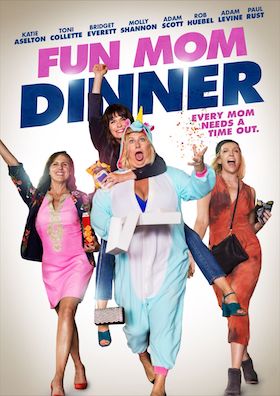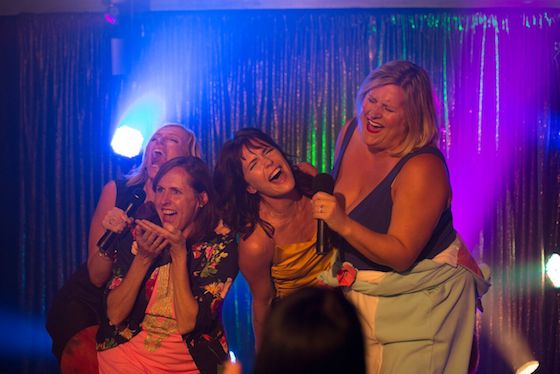
[Rating: Minor Rock Fist Up]

Fun Mom Dinner knows what it wants to do, and goes after it with a fearless attitude and hard-R-rating sensibilities. Cut from the same cloth as Bridesmaids, Bad Moms, and Girls Trip, it explores the hard knocks and frustrations of modern women in a setting that allows them to eschew “perfect” norms and expectations. And while it is a little thin on earned character development, it makes up for this by being funny as hell while going after some difficult truths in an earnest way.
Fun Mom Dinner focuses primarily on Emily (Kate Aselton), who has just moved to a new city with her husband and two kids when the film opens. Her best friend from high school, Kate (Toni Collette), lives in the community and sends her kids to the same pre-K, where Emily meets two other moms one afternoon: Melanie (Bridgette Everett) and Jamie (Molly Shannon). Both are excited to meet Emily, and invite her out for a girls-only dinner to unwind and relax. Emily is eager to get away for an evening, and manages to get the reluctant Kate to come with her, allowing for an evening of venting and bonding.
Narrative-wise, screenwriter Julie Rudd does a good job keeping her story tight and focused. The A-plot remains dialed into the bonding and commiseration of the four moms as they discuss their hardships and frustrations, while the B-plot adds counterbalance by sticking with two of the husbands holding down the fort at home. Emily’s spouse, Tom (Adam Scott), gets schooled by the more experienced Andrew (Rob Huebel), on how to juggle work, marriage, and fatherhood, which is a good thing, as the story sets Tom up to be utterly clueless early on. Tom’s failing in this regard fuels the central conflict of the picture, which sees Emily reevaluate her life’s choices as it concerns her abandoned career and full-time motherhood.
And while this Talking Heads ‘Once in a Lifetime’-style assessment of middle-age ennui feels genuine, and true to life, it seems incomplete at times. If there is a push and pull between motherhood and independence going on inside of Kate and the other moms, where does one stop, and the other begin? In other words, what is so great about motherhood and marriage that keeps them coming back for more every day despite the hassles of being 24/7 matriarchs? Although Jamie, recently divorced and on the Tinder prowl, demonstrates that she is actively trying to do something different with her life, the other three mothers are a bit scattered as it concerns their place in the world.
There’s plenty of talk about how tough it is to be a mom in Fun Mom Dinner, yet little in the way of a discussion about what makes all that sacrifice worth it. Likewise, although Tom and Andrew spend a great deal of time chatting about what it takes to be a good husband, neither expresses any real satisfaction with fatherhood or marriage. Although the predictable journey of parents coming together to realize that their differences mean nothing compared to their shared struggles is wrapped up nicely, what it means to them to be moms, dads, husbands, and wives is an elusive topic that goes largely unexplored.
Still, whatever missteps there might be, the comedic backgrounds of Aselton, Shannon, and Everett mix well with the dramatic chops Collette brings to the table. Indeed, the performances carry the whole effort, and are a testament to what great talent in front of the camera can do to inject life into a story that needs a few of its thematic dots connected. The pacing of the film keeps events moving at a brisk pace, and despite a third act that feels somewhat unmoored from the rest of the picture, things wrap up nicely.
The one noticeable element that seems to be missing is a villain. The real antagonist of Fun Mom Dinner is time, as all four of these women are exhausted from the domestic gridlock that ties up the spare minutes and hours of their days, not to mention the fear they share regarding their best years as being behind them. On the one hand, this puts Fun Mom Dinner on a more cerebral plane, and forces the characters and their growth to take place on a more emotional level (rather than against a straw-man baddie). On the other hand, Emily is the only character the script draws out into anything resembling a complete character. If this is indeed a story about maturation and self-discovery, it would have helped to develop the other three moms as more than just character sign-posts (i.e., divorced mom, burned out mom, over-achieving mom) so that they could share in the growth. A bad guy or gal might have helped in this regard.
Interestingly enough, Fun Mom Dinner leans heavily into its many Sixteen Candles references, and just like in that movie, only one person (Molly Ringwald there, Kate Aselton here) gets a real arc. John Hughes got away with that because he only had one lead, whereas director Alethea Jones must juggle four. This doesn’t make Fun Mom Dinner a bad movie by any means, just a little incomplete considering the ball it is swinging at. Had the film spent 10-15 minutes rounding out its characters to give each of them a completed journey, it might have been a home run (at 82 minutes, pre-credits, it certainly had room for this). As it is, Fun Mom Dinner is a respectable infield single, and no one is apt to complain about that.







Comments on this entry are closed.